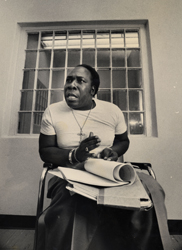UAlbany National Death Penalty Archives Add Papers of "America's Foremost Death Penalty Historian"
Extensive records of M. Watt Espy date to 1608 and colonial Jamestown
Contact(s): Catherine Herman (518) 956-8150, ([email protected])
_scaled.jpg) |
| Fourteen-year-old George Stinney Jr., who was electrocuted in Clarendon County, South Carolina, and one of the youngest persons to be executed in the United States in the 20th Century |
M. Watt Espy, Jr. has been described in a New York Times article (Oct. 21, 1987) as "America's foremost death penalty historian.'' Espy, who resides in Headland, Ala., has devoted nearly four decades of research to documenting more than 15,000 executions in America, dating to 1608 and colonial Jamestown. He traveled extensively, spending countless thousands of hours painstakingly compiling information about executions throughout the country's history. His work is a unique and invaluable contribution to the history of capital punishment in this country. It will become available for study by historians, researchers, and interested members of the public as a part of UAlbany's NDPA.
The M. Watt Espy Executions in America Collection includes 95 boxes containing research folders, newspaper articles, and a wide variety of correspondence; approximately 1,125 books and handwritten ledgers containing an alphabetical list of executed individuals by state and by date from 1600 to 1995. Cases are documented by newspapers articles, magazine articles, official reports and correspondence. Among the material is a list of all individuals electrocuted in New York State. The boxes also hold hundreds of letters from Watt Espy to local libraries, historical societies and archives, as well as personal correspondence with death row prisoners, scholars, historians, and numerous attorneys from around the United States. Among the photographic material are individuals on death row, as well as of slaves appearing to be on the verge of execution. The collection also contains copies of speeches delivered by Watt Espy.

|
| Willie Jasper Darden, Jr., executed by the State of Florida on March 15th, 1988, but not before his case went to the United States Supreme Court. |
NDPA was initiated by UAlbany's Capital Punishment Research Initiative (CPRI) as part of its mission to collect, archive, and make available historical and other material on the death penalty in America.
The University at Albany Library's M.E. Grenander Department of Special Collections and Archives is collaborating with CPRI to maintain and grow the National Death Penalty Archive.
UAlbany's School of Criminal Justice announced the establishment of NDPA, a national repository of archival material devoted solely to the death penalty, in August 2005. The National Death Penalty Archive was initiated by the school's Capital Punishment Research Initiative (CPRI) to collect archival materials documenting the important history of capital punishment, and to provide resources for historical scholarship. The collection of historical materials will be an unrivaled resource for scholars, students, and the public interested in the history of capital punishment in America, and in the legal and political battles engendered by the sanction. In addition to housing the records and documents of leading figures in scholarship, and legal and community organizations concerning capital punishment, the archive includes oral history interviews featuring prominent activists and professionals involved in death penalty abolition efforts and related work.
The Capital Punishment Research Initiative, part of the Hindelang Criminal Justice Research Center, was founded in the late 1990s with three primary goals: (1) to build and maintain a national archive for historical documents and data on the death penalty; (2) to plan and conduct basic and policy related research on capital punishment; and (3) to encourage scholarship, conduct graduate and undergraduate training, and disseminate scientifically grounded knowledge about the ultimate penal sanction.
[email protected]
